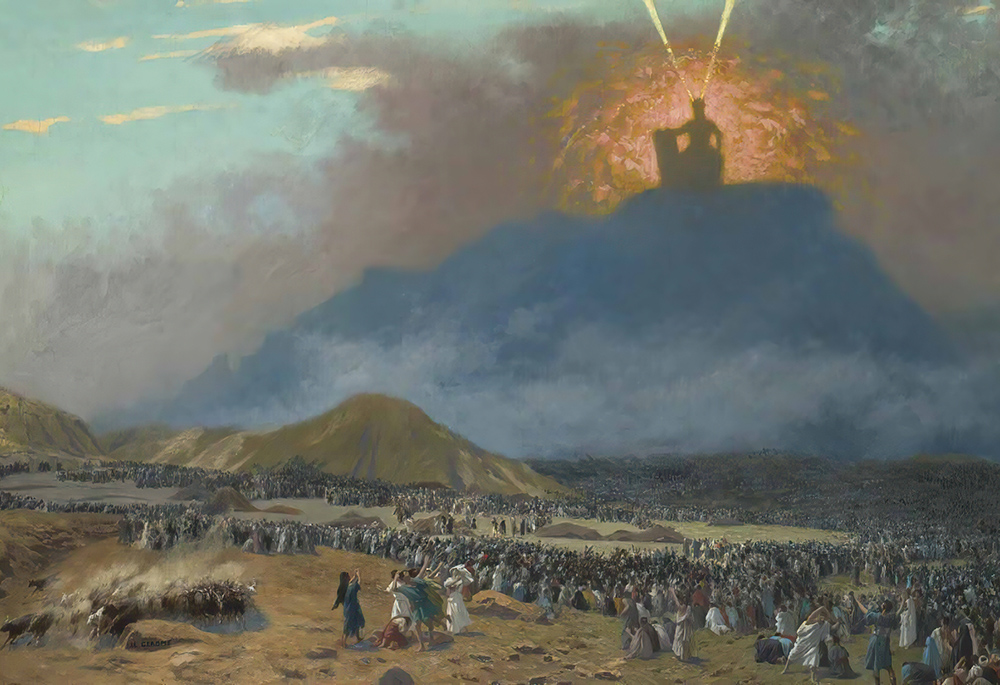
"Moses On Mount Sinai" by Jean-Léon Gérome (Artvee)
How to approach the unapproachable? How to imagine the unimaginable? The Solemnity of the Most Holy Trinity raises questions like these. The Scriptures offer tremendous help in our search to know what God is like, not because they give us a clear answer, but precisely because they do not.
The Hebrew and Christian Scriptures offer us images of God as omnipotent creator and as an artisan who fashions creatures from river mud; God dwells in unapproachable light and walks and talks with Abraham. God appears in cloud and fire, and is heard in thunder and the gentlest breeze. God speaks in the direst warnings of the prophets and the consoling words of a stranger on the road to Emmaus.
Today, Exodus reveals more than we might realize as Moses leads us up the mountain. One of the first things to notice here is the name, "Lord." That word replaced the sacred Tetragrammaton, the four-letter Hebrew word, YHWH, the divine name. From earliest times, the Jewish people regarded that name as too sacred to even attempt to pronounce. Wherever it was written they circumvented it, usually saying Adonai ("my Lord") to refer to God.
The early Christians respected that reverence, translating the name as Kyrios or Dominus. In 2008, the Vatican Congregation for Divine Worship reminded Catholics to continue that practice. The first thing Exodus tells us today is that God's name is immeasurably sacred. We cannot define God.
As we read this Exodus passage, we realize that only God pronounces the sacred name and follows it with a self-description. According to this auto portrayal, God is "merciful and gracious, slow to anger and rich in kindness and fidelity." Those interrelated words create a litany that portrays the gentle and loving ways the Lord relates to humanity. No wonder Moses begged God to come along with his unruly flock!
Today's Gospel enlarges our sense of the divine image in two ways. First, while we are accustomed to encountering John 3:16 ("God so loved the world") on billboards or at sports events, scholars offer a slightly different translation from the slogan we ordinarily hear.
According to Scripture scholar Edward Klink, this passage is best translated as, "For in this way God loved the world." That subtly nuances the idea, not measuring how much, but rather how God loves, telling us that God loves through the "unique son." Secondly, this passage from John elaborates on Exodus and the whole of the Hebrew Scriptures as it explains that God's love is always demonstrated in action: Every moment of Jesus' life demonstrated how God loves the world.
Today's Scriptures insist that the God of Christianity is a God who loves real people in real time. Anyone who understands this would, like Moses, invite this God to accompany them along the road of life. That's a bit of what we can derive from our selections from Exodus and John.
Advertisement
Today's selection from the end of Paul's Second Letter to the Corinthians was chosen because it is one of the few passages in Scripture that clearly speaks of God as Father, Son, and Holy Spirit. Speaking of the Trinity, it draws us into what is the most mysterious of Christianity's beliefs.
While the New Testament does not really develop a Trinitarian concept of God, Jesus subtly introduced the concept of the Trinity by referring to his relationship to his father and in his promise to send his Spirit. Paul's letters are more specific when they refer to God under the three distinct names of Father, Son and Spirit. Over a period of nearly 400 years, these references, combined with prayer and theologizing, came to fruition in what we now pray as the Nicene Creed.
What then, does this feast day mean for us? What are we celebrating? Based on today's Scriptures, we can say that this feast focuses our attention on God's self-revelation as loving and deeply involved with humanity from the moment of human consciousness. More specifically, this feast invites us to contemplate the depth of God's love and God's desire to draw all into divine life. It celebrates the love of God revealed in Jesus and our invitation for God's Spirit to be active in and among us.
We cannot adequately name God, yet we experience the unapproachable mystery inviting us to awe and drawing us close. Through creation and revelation, we can experience uncountable ways in which the unimaginable one lures us to share divine life. Now, we can bask in miniature glimpses of God. We await the day when "we will be like Christ because we will see him face to face" (1 John 3:2).








